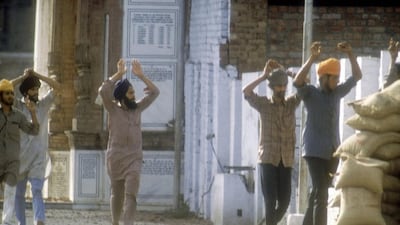LONDON // The British government has admitted it advised India before the deadly 1984 raid on the Golden Temple in Amritsar.
The British foreign secretary William Hague told parliament on Tuesday that Britain’s military advice had only a “limited impact” on the operation.
The government ordered an urgent investigation into possible UK involvement in the raid after recently declassified documents suggested a special forces officer advised the Indians.
Mr Hague said the review “finds that the nature of the UK’s assistance was purely advisory, limited and provided to the Indian government at an early stage; that it had limited impact on the tragic events that unfolded at the temple three months later; that there was no link between the provision of this advice and defence sales and there is no record of the [British] government receiving advance notice of the operation.”
The official inquiry by the cabinet secretary was ordered after documents released under the 30-year rule suggested that a special operations officer secretly advised the Indians about how to deal with the Sikh dissidents occupying the holy site.
The officer, who has not been named, visited India in February 1984 and said a military assault should be a last resort and conducted by paramilitary forces using helicopters to achieve surprise. This plan was to be used only if negotiations had failed and was designed to minimise casualties, Mr Hague said. The eventual attack in June, named Operation Blue Star, was conducted by the Indian army.
“The main concept behind the operation changed,” Mr Hague told parliament. “Operation Blue Star was a ground assault, without the element of surprise, and using ground troops without a helicopter-borne element.”
Mr Hague said Britain gave the initial advice on the request of the Indian government because the two countries have an “important relationship”.
He dismissed suggestions from some British Sikhs that the advice was given in the hope that it would win defence contracts for British companies.
Retired Indian army lieutenant-general Kuldip Singh Brar, who led the assault, said last week that it was the first he had heard of any British involvement.
Four members of a Sikh gang were jailed in Britain in December for slashing Mr Brar’s throat in an attempted revenge attack as he walked through London with his wife two years ago.
The storming of the Golden Temple, Sikhism’s holiest site, was one of the most violent episodes in the Indian government’s battle against Sikh separatists, with more than 1,000 people dying, and led to a breakdown in communal relations across India.
The raid on the temple located about 400 kilometres north of New Delhi came as an insurgency for an independent Sikh state was festering, with armed militants launching attacks in India’s Punjab state to press their demands for the establishment of Khalistan, or “Land of the Pure” in the Punjabi language.
The attack enraged Sikhs and led to the assassination of the prime minister, Indira Gandhi, a few months later by two of her Sikh bodyguards – an act that provoked anti-Sikh riots across much of northern India in which thousands were killed.
The riots, in turn, further fuelled the insurgency.
Before it was stamped out in the late 1980s, the rebellion eventually cost more than 18,000 lives – including 329 people killed when a bomb planted aboard an Air India flight from Montreal to London exploded over the Atlantic Ocean, an attack which was blamed on Canada-based Sikhs.
* Associated Press with additional reporting by Agence France-Presse and Bloomberg News

